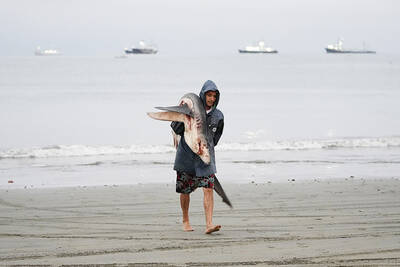The Chinese government has rejected the visa application of a veteran US journalist who had been waiting eight months to begin a new reporting job in China for Thomson Reuters, the company said.
The reporter, Paul Mooney, said the Chinese Ministry of Foreign Affairs told Reuters on Friday that it would not grant him a resident journalist visa, but declined to provide a reason. Mooney returned to the US last year after the expiration of his previous visa, which was sponsored by the South China Morning Post, a newspaper based in Hong Kong.
The rejection comes at a time of rising tensions between foreign news organizations and the government, which has been using its economic clout, the issuance of visas and Internet controls to express displeasure with coverage it deems unflattering.
“China has been my career,” Mooney, who has spent three decades covering Asia, the past 18 years based in Beijing, said on Saturday in a telephone interview. “I never thought it was going to end this way. I’m sad and disappointed.”
The Web sites for Bloomberg News and the New York Times have been blocked in China for more than a year following the publication of investigative articles by both news organizations that detailed the wealth accumulated by relatives of top Chinese leaders. Since then, employees for both Bloomberg and the Times have been awaiting residency visas that would allow them to report from China.
Such tactics appear to have had an impact. On Saturday, the Times detailed a decision late last month by Bloomberg to withhold publication of an investigative report, more than a year in the works, that explored hidden financial ties between one of China’s wealthiest men and the families of senior Chinese leaders. Reporters with the company said the editor-in-chief, Matthew Winkler, defended the decision by comparing it to the self-censorship by foreign news bureaus that sought to remain working inside Nazi Germany. Winkler and a senior editor denied that the articles had been killed and said they would eventually be published.
The Chinese government’s rejection of Mooney’s visa request will certainly add to the anxieties of foreign reporters in China, many of whom complain of cyberattacks, police interference and intimidation, especially during the annual visa renewal process, currently underway, which sometimes involves interviews with foreign ministry officials or public security personnel.
In a statement, the Foreign Correspondents Club of China said: “Such delays and lack of transparency merely add to the impression that the visa process is being used by the authorities to intimidate journalists and media organizations.”
Mooney said he suspected that the government’s decision to deny him a visa was punishment for his persistent coverage of human rights abuses in China.

WAKE-UP CALL: Firms in the private sector were not taking basic precautions, despite the cyberthreats from China and Russia, a US cybersecurity official said A ninth US telecom firm has been confirmed to have been hacked as part of a sprawling Chinese espionage campaign that gave officials in Beijing access to private texts and telephone conversations of an unknown number of Americans, a top White House official said on Friday. Officials from the administration of US President Joe Biden this month said that at least eight telecommunications companies, as well as dozens of nations, had been affected by the Chinese hacking blitz known as Salt Typhoon. US Deputy National Security Adviser for Cyber and Emerging Technologies Anne Neuberger on Friday told reporters that a ninth victim

Russia and Ukraine have exchanged prisoners of war in the latest such swap that saw the release of hundreds of captives and was brokered with the help of the United Arab Emirates (UAE), officials said on Monday. Ukrainian President Volodymyr Zelenskiy said that 189 Ukrainian prisoners, including military personnel, border guards and national guards — along with two civilians — were freed. He thanked the UAE for helping negotiate the exchange. The Russian Ministry of Defense said that 150 Russian troops were freed from captivity as part of the exchange in which each side released 150 people. The reason for the discrepancy in numbers

A shark attack off Egypt’s Red Sea coast killed a tourist and injured another, authorities said on Sunday, with an Italian Ministry of Foreign Affairs source identifying both as Italian nationals. “Two foreigners were attacked by a shark in the northern Marsa Alam area, which led to the injury of one and the death of the other,” the Egyptian Ministry of Environment said in a statement. A source at the Italian foreign ministry said that the man killed was a 48-year-old resident of Rome. The injured man was 69 years old. They were both taken to hospital in Port Ghalib, about 50km north

MISSING: Prosecutors urged the company to move workers out of poor living conditions to hotels, but residents said many workers had already left the town Brazil has stopped issuing temporary work visas for BYD, the Brazilian Ministry of Foreign Affairs said on Friday, in the wake of accusations that some workers at a site owned by the Chinese electric vehicle producer had been victims of human trafficking. The announcement came days after labor authorities said they found 163 Chinese workers who had been brought to Brazil irregularly in “slavery-like” conditions at the BYD factory construction site in the northeastern state of Bahia. The workers were employed by contractor Jinjiang Group, which has denied any wrongdoing. Later, the authorities also said the workers were victims of human trafficking,